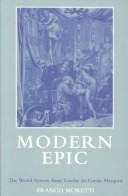Literary history has long been puzzled by how to classify and treat aesthetic monuments. In this interdisciplinary work, Franco Moretti builds a super-genre that has provided many of the "sacred texts" of Western literary culture. He provides a taxonomy capable of accommodating "Faust", "Moby-Dick", "The Nibelung's Ring", "Ulysses", "The Cantos", "The Waste Land", "The Man Without Qualities" and "One Hundred Years of Solitude". For Moretti, the significance of the modern epic reaches well beyond the aesthetic sphere: the modern epic is the form that represents the European domination of the planet, and establishes a solid consent around it. Political ambition and formal inventiveness are here continuously entwined, as the representation of the world-system stimulates the technical breakthroughs of polyphony, reverie and leitmotiv, of the stream of consciousness, collage and complexity. Opening with an analysis of Goethe's "Faust" and the different historical roles of the epic and the novel, the text moves through a discussion of Wagner's "Ring" and on to a sociology of modernist technique.
He ends with an interpretation of magical realism as a compromise formation between a number of modernist devices and the return of narrative interest, and suggests that the West's enthusiastic reception of these texts (and of "One Hundred Years of Solitude" in particular) constitutes a ritual self-absolution for centuries of colonialism. Franco Moretti is the author of "Signs Taken for Wonders" and "The Way of the World".
- ISBN10 1859849342
- ISBN13 9781859849347
- Publish Date 13 March 1996
- Publish Status Out of Print
- Out of Print 25 May 2001
- Publish Country GB
- Imprint Verso Books
- Format Hardcover
- Pages 272
- Language English
